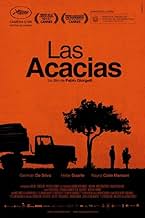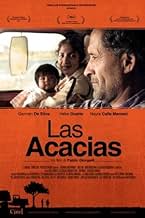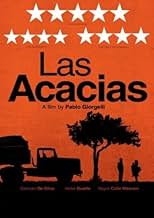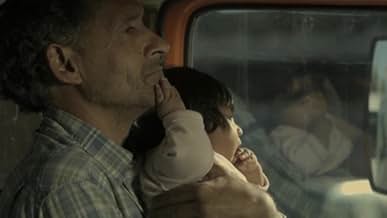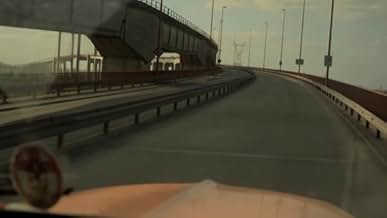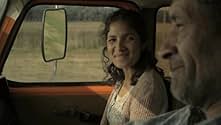IMDb RATING
6.9/10
2.5K
YOUR RATING
Reluctantly, a dour long-distance truck driver agrees to give a lift to a Paraguayan single mother and her five-month-old daughter to Buenos Aires. Can the palpable silence soften up the tac... Read allReluctantly, a dour long-distance truck driver agrees to give a lift to a Paraguayan single mother and her five-month-old daughter to Buenos Aires. Can the palpable silence soften up the taciturn trucker's sullen heart?Reluctantly, a dour long-distance truck driver agrees to give a lift to a Paraguayan single mother and her five-month-old daughter to Buenos Aires. Can the palpable silence soften up the taciturn trucker's sullen heart?
- Director
- Writers
- Stars
- Awards
- 19 wins & 22 nominations total
Germán De Silva
- Rubén
- (as Germán de Silva)
Matilde Jazmín Mamani
- Prima Anahí
- (as Matilde Jazmín Quispe Mamani)
Odón Morán López
- Camionero Paraguayo
- (as Odón Morán Lopez)
Darío Luchetta
- Camionero en asado
- (as Darío Lucchetta)
Yanina López
- Hija dueña parrilla
- (as Yanina Paz López)
- Director
- Writers
- All cast & crew
- Production, box office & more at IMDbPro
Featured reviews
In Paolo Giorgelli's quiet film 'Las Acacias', not a lot happens. A truck driver with a load of wood (hence the title) gives a lift, somewhat reluctantly, to a woman with a child. They don't talk a lot, but they're both lonely; by the end of the movie, they decide they'd like to see each other again. And that's it. The film covers a journey of 800 miles through South America, but there are no stunning landscapes on view: just a lot of scenes of two people sitting quietly in a cab. And yet, almost strangely, it doesn't drag: there's a feeling of truthfulness that compensates for the absence of action. In spite of being almost unremarkable by design, it's understated quality tells in the end.
Las Acacias begins with the sound of a chainsaw followed by a lumberjack felling a fairly large tree. Many others fall and they are then loaded on to a tractor trailer. A man drives alone, lost in his thoughts, as he carries the cargo through the rural countryside. He stops at a truck stop to wash up and we can see a scar, curving from his back shoulder to his ribs. He steps outside to smoke a cigarette and a young woman approaches with a baby and asks if he is Ruben. He replies yes and that he was not told about the child. She explains that it is a misunderstanding and they get into the rig and Ruben seems less than thrilled with his passengers.
First stop, "welcome to Paraguay" on a sign and he tells her to get out and walk across the border and he will pick them up on the other side. He fills out the necessary paper work and then eats dinner alone. She gets back in and at the next stop the officers ask to see her papers and ask if she has the fathers permission to travel with her offspring. She answers that there is no father. Ruben takes the pair to a diner so that madre can feed little nina.
Back on the road, he finally asks her name, which turns out to be Jacinta and her child is Anani. She asks if he has a family, and at first he says no but then admits to having a son. On route he pays a short visit to his sister and afterwords finds a peaceful lake to sit beside with his passengers where they discuss mundane things like dogs, which they both like, and Anani's age which is five months. There is very little conversation, with most communication being non verbal. Both actors are very good at showing their feelings with facial expressions. As the drive progresses, Ruben grows more and more attached to Jacinta and Anani and as it nears the conclusion I actually cared what happened to them, which is a rare thing in most movies. I do not agree with the negative reviews posted, complaining about the lack of dialogue. Be patient and let the subtlety overtake you, as it did me.
First stop, "welcome to Paraguay" on a sign and he tells her to get out and walk across the border and he will pick them up on the other side. He fills out the necessary paper work and then eats dinner alone. She gets back in and at the next stop the officers ask to see her papers and ask if she has the fathers permission to travel with her offspring. She answers that there is no father. Ruben takes the pair to a diner so that madre can feed little nina.
Back on the road, he finally asks her name, which turns out to be Jacinta and her child is Anani. She asks if he has a family, and at first he says no but then admits to having a son. On route he pays a short visit to his sister and afterwords finds a peaceful lake to sit beside with his passengers where they discuss mundane things like dogs, which they both like, and Anani's age which is five months. There is very little conversation, with most communication being non verbal. Both actors are very good at showing their feelings with facial expressions. As the drive progresses, Ruben grows more and more attached to Jacinta and Anani and as it nears the conclusion I actually cared what happened to them, which is a rare thing in most movies. I do not agree with the negative reviews posted, complaining about the lack of dialogue. Be patient and let the subtlety overtake you, as it did me.
A visual narrative on ordinary folk with a simple but instantly recognisable theme - loneliness. Argentina of late has produced some magical road films featuring the lives of everyday characters - and they are all a joy to watch. It matters not that the dialogue, what little there is of it, is in Spanish. It could be a silent film or dubbed in Arabic. The film speaks for itself. It is so well crafted. A roughneck lorry driver who has travelled the highways of Argentina for 30 years and used to his own space, is ordered by his boss to take one of his journeys south to Buenos Aries with a passenger - a young mother and child. Gradually, as the journey progresses and he becomes more and more frustrated with the noise and demands of the child, but a bond slowly comes through. This is a very touching film and very well made. The open road is shown not as dramatic backdrop in panorama - but as a close-up with each of the characters in the shot. There are a number of comments made by reviewers here that liken the film to watching paint dry etc. I think these people went to the cinema expecting another Die Hard, Steven Seagal, Van Damme, Terminator shoot em up Hollywood rubbish. Suggest that in future they read the poster before venturing further.
Cinema isn't just there to entertain (or make money) it is also to educate and generate thought. Well recommended piece of social realism.
Cinema isn't just there to entertain (or make money) it is also to educate and generate thought. Well recommended piece of social realism.
I watched this film last night and I thought it is going to be boring. It wasn't the case in the end, because I felt like I was part of the journey, I was in the car and I couldn't hardly wait to get to Buenos Aires, and once there, I felt like I know my trip mates better. :) The baby was more than amazing! She's like a little star! I think when she'll grow up and see her performance she'll have all the reason to be proud for herself :) An achievement :)
It may seem like the whole film is event-less but I was positively surprised to see that the outcome was better then expected. I can easily imagine this to happen for real... Like I said I only recommend this film only if you're not infected with the holywoodian kind of "film".
It may seem like the whole film is event-less but I was positively surprised to see that the outcome was better then expected. I can easily imagine this to happen for real... Like I said I only recommend this film only if you're not infected with the holywoodian kind of "film".
Since its inception in the 1960s, the road movie genre has always represented adventure, debauchery and freedom. One is put in mind of Bonnie and Clyde charging along an open road leaving bodies and bank vaults in their wake, or Wyatt and Billy in Dennis Hopper's Easy Rider blowing joint smoke in the face of conformity.
Argentinean director Pablo Giorgelli's debut feature Las Acacias embodies none of these conventions, but it is a road movie in the most essential sense of the phrase. It is a story about driving from point A to point B: middle-aged truck driver Rubén (Germán de Silva) has been asked by his boss to transport single mother Jacinta (Hebe Duarte) and her five-month-old daughter Anahí (Nayra Calle Mamani) to her cousin's house in Buenos Aires, where she hopes to find work. Other than the occasional stop to refuel and have dinner, it is a full 85 minutes of Rubén just getting on with the job.
In the film's opening half hour we are constantly taunted with the possibility of conventional drama, yet it is dismissed at every turn. Going on Rubén's gruff demeanour, one assumes this may be a slightly dodgy arrangement, in which Jacinta has paid Rubén's boss to help her get out of the country. However, it turns out to be pretty much above board. When they are stopped at the border, one expects them to spout a web of lies to keep the shady truth from the inspectors, but in fact they merely explain themselves sincerely and are let through without any hassle. Similarly, the mystery surrounding Jacinta and Anahí, who she insists 'has no father', is never really explored. At one point, Ruben sees Jacinta crying, but instead of asking her what's wrong and give her the chance to tell her story, he walks away.
After a while you're forced to confront the fact that the film isn't going to diverge at all from the straightforward route it set out to take. At the Sunday morning 'OAPs get in free' screening that I attended, a good few of the older patrons eventually gave up and walked out, unable to bear the boredom anymore and free from the desire to get their money's worth. Yet as gruellingly tedious as Las Acacias can be, if you persist you're gifted with a touching and surprisingly unique film experience.
Unlike the road movie heroes of old, who took to the highway in search of adventure, driving is Ruben's profession and it isolates him from the rest of the world. Constantly hauling lumber from one place to the next, he is deprived of any human contact, and at the beginning he sees Jacinta and Anahí as a mere inconvenience. But in spite of Rubén's detachment and Jacinta's 'I've been hurt before' timidity, the two begin to bond. While the premise is admittedly a little corny, their relationship unfolds in a completely natural way, emanating out of brief conversations and fleeting glances. Of course, this is all far from exciting, but Giorgelli's pared-down style brings a reality and poignancy to the narrative, which is in itself rather captivating.
The most diligent viewer should be forgiven for phasing out from time to time, but boredom seems to be an essential reaction which the film seeks to invoke. Forced to spend an hour-and-a-half imprisoned in Rubén's truck, we become like another passenger, and while your eyes may occasionally wander or you may even nod off, you nevertheless find yourself engrossed in their journey. The film builds softly to a bittersweet ending and having been so closely subjected to this would-be courtship yourself, it is all the more heartrending.
Las Acacias is a road movie about as exciting as a long commute. Nothing really happens and even less is said. But within its static, self- contained world, something pretty remarkable takes place.
Argentinean director Pablo Giorgelli's debut feature Las Acacias embodies none of these conventions, but it is a road movie in the most essential sense of the phrase. It is a story about driving from point A to point B: middle-aged truck driver Rubén (Germán de Silva) has been asked by his boss to transport single mother Jacinta (Hebe Duarte) and her five-month-old daughter Anahí (Nayra Calle Mamani) to her cousin's house in Buenos Aires, where she hopes to find work. Other than the occasional stop to refuel and have dinner, it is a full 85 minutes of Rubén just getting on with the job.
In the film's opening half hour we are constantly taunted with the possibility of conventional drama, yet it is dismissed at every turn. Going on Rubén's gruff demeanour, one assumes this may be a slightly dodgy arrangement, in which Jacinta has paid Rubén's boss to help her get out of the country. However, it turns out to be pretty much above board. When they are stopped at the border, one expects them to spout a web of lies to keep the shady truth from the inspectors, but in fact they merely explain themselves sincerely and are let through without any hassle. Similarly, the mystery surrounding Jacinta and Anahí, who she insists 'has no father', is never really explored. At one point, Ruben sees Jacinta crying, but instead of asking her what's wrong and give her the chance to tell her story, he walks away.
After a while you're forced to confront the fact that the film isn't going to diverge at all from the straightforward route it set out to take. At the Sunday morning 'OAPs get in free' screening that I attended, a good few of the older patrons eventually gave up and walked out, unable to bear the boredom anymore and free from the desire to get their money's worth. Yet as gruellingly tedious as Las Acacias can be, if you persist you're gifted with a touching and surprisingly unique film experience.
Unlike the road movie heroes of old, who took to the highway in search of adventure, driving is Ruben's profession and it isolates him from the rest of the world. Constantly hauling lumber from one place to the next, he is deprived of any human contact, and at the beginning he sees Jacinta and Anahí as a mere inconvenience. But in spite of Rubén's detachment and Jacinta's 'I've been hurt before' timidity, the two begin to bond. While the premise is admittedly a little corny, their relationship unfolds in a completely natural way, emanating out of brief conversations and fleeting glances. Of course, this is all far from exciting, but Giorgelli's pared-down style brings a reality and poignancy to the narrative, which is in itself rather captivating.
The most diligent viewer should be forgiven for phasing out from time to time, but boredom seems to be an essential reaction which the film seeks to invoke. Forced to spend an hour-and-a-half imprisoned in Rubén's truck, we become like another passenger, and while your eyes may occasionally wander or you may even nod off, you nevertheless find yourself engrossed in their journey. The film builds softly to a bittersweet ending and having been so closely subjected to this would-be courtship yourself, it is all the more heartrending.
Las Acacias is a road movie about as exciting as a long commute. Nothing really happens and even less is said. But within its static, self- contained world, something pretty remarkable takes place.
Did you know
- TriviaFilmed in five weeks between Paraguay and Buenos Aires.
- ConnectionsFeatured in The Smallest Red Carpet, But the Biggest Heart (2011)
Details
- Release date
- Countries of origin
- Official sites
- Languages
- Also known as
- Las Acacias
- Filming locations
- Production companies
- See more company credits at IMDbPro
Box office
- Gross US & Canada
- $6,000
- Opening weekend US & Canada
- $6,000
- Sep 9, 2012
- Gross worldwide
- $355,979
- Runtime
- 1h 22m(82 min)
- Sound mix
- Aspect ratio
- 1.85 : 1
Contribute to this page
Suggest an edit or add missing content

